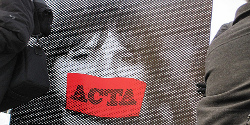Is ACTA dead?
ACTA may have been put to rest for now, but it could strike back at any time

Image: By ottodv (CC BY-SA 2.0)
"Is ACTA dead?" It is a question often heard, or even a fact stated. And despite the impact of mass protests and the recent turns of events, it ain't over till it's over. ACTA may be in a coma, following a legal check at Europe's highest Court. However, the patient may have been brought back to life this week when the European Parliament voted against it's own referral to the same court. What factors contribute to ACTA's diagnosis?
Protests in all major European cities and hundreds of thousands of concerned emails to Members of the European Parliament have raised awareness among politicians that ACTA causes many essential concerns. Some happily declared ACTA dead after the significant loss of support in Brussels and the Member State governments.
The European Commission has attempted to resuscitate ACTA by referring the controversial agreement to the Court of Justice of the EU for a legal check. Shortly after, David Martin, the newly appointed MEP responsible for the ACTA dossier, announced that the European Parliament would be asking its own questions to the European Court of Justice. This course of action was blocked by a majority in the leading committee of the European Parliament this week.
"I regret that the European Commission tries to regain control of the process by sending ACTA to the Court for a legal check. Earlier, the European Parliament's request for such a check was disregarded", liberal MEP Marietje Schaake noted. "It is unsure whether the request for a legal opinion suspends the ratification process, but the European Parliament's committees will now resume their work on formulating opinions on ACTA, and vote on the controversial agreement in June."
The responsible committees of the Parliament are continuing their work on drafting opinions in the fields of their competencies. However, the fate of ACTA seems bleak at the moment.
Bulgarian MEP Ivailo Kalfin speaks for many when he said that the ACTA agreement is ill fated, since it concerns many people around the globe but the text was drafted in secrecy, without taking into consideration the stakeholder's opinions and by bypassing the legitimate international bodies. As a result the text contains many structural deficiencies and contradicts with well established practices and principles in the internet space.
Dutch MEP Marietje Schaake is also particularly concerned with the mix of issues ACTA tries to regulate. "The European Commission is regulating counterfeit (physical, tangible) goods and the use of (digitized, intangible) works online with the same remedies. Digital media sharing should not be enforced the same way as trade in fake medicines and other dangerous goods being produced by organized criminal networks. Considering the theft of products from shops equal to sharing music files shows an alarming lack of understanding of the digital age. All the talk of enforcement would almost make us forget the tremendous opportunities of bringing content to audiences at lower prices, thanks to the digital revolution. We must ensure our fragmented copyright laws or ACTA do not hamper Europe´s digital market, or our competitive position in the global economy."
MEPs Schaake and Kalfin agree that whatever the opinion of the ECJ, the European Parliament has serious reasons to diagnose ACTA as the wrong medicine for many different diseases. "It is not about compliance with the EU acquis, it is about the future of the Internet and the ability of the EU to protect intellectual property rights without hampering internet freedom and the technological development", Ivailo Kalfin concluded.
ACTA is not dead, and a lot of work continues to be done. It is unsure whether ACTA is currently in a coma, but sooner or later the European Parliamentarians will likely cast their decisive vote in June. Those who want to help raise concerns, please do so with the accuracy of a CT scan, and the precision of a surgeon. Misinformation in the anti-ACTA lobby has cost a lot of credibility.
MEP's Kalfin and Schaake will be organising a stakeholder hearing about ACTA on April 11th from 13.00 - 15.00. Several organisations that have been critical about ACTA will come to explain their reasons for opposing the treaty. You can follow the proceedings online, or register to attend the event by mailing marietje.schaake-officeuroparl.europa.eu.
Tags
Share this article











Comments
Comments (1)

Latest Articles
Featured Article
Schmidt Happens

Wendy M. Grossman responds to "loopy" statements made by Google Executive Chairman Eric Schmidt in regards to censorship and encryption.
ORGZine: the Digital Rights magazine written for and by Open Rights Group supporters and engaged experts expressing their personal views
People who have written us are: campaigners, inventors, legal professionals , artists, writers, curators and publishers, technology experts, volunteers, think tanks, MPs, journalists and ORG supporters.






powned:
Apr 04, 2012 at 12:45 PM
Don't stop!
They will try over and over again.....
http://powned.dk